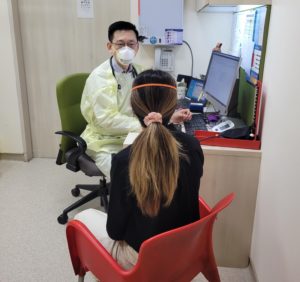Frontier Healthcare Group, which joined Qualitas’ network in Singapore last year, has a vision to deliver efficient and equitable primary care to its communities in a system that is still fragmented. To this end, it opened the Frontier Family Medicine Clinic in 2013. Dr Koh Thuan Wee, Clinical Head of Frontier Family Medicine Clinic, explains how they are working to close the gaps in primary care in Singapore.

Even as the challenges of each country’s healthcare system are unique, the healthcare gaps from the patient’s perspective are mostly generic. Specialisation of healthcare has brought about efficiencies and improvement in outcomes, but the answer to the ensuing fragmentation of care remains elusive.
Primary care is still the best solution to this conundrum. However, entrenching primary care as the foundation of an integrated healthcare system remains complex and challenging.
With the support of the Ministry of Health (MOH) in Singapore, Frontier Family Medicine Clinic (FFMC) was founded in 2013 by a group of like-minded primary care physicians, specialists and administrators from Frontier Healthcare Group (Frontier) and the National University Healthcare System (NUHS). The aim was to establish a team-based primary care medical centre delivering patient-centric integrated care.
This team-based care was made possible by interorganisational staffing from both Frontier and NUHS. Besides the Primary Care Physicians, there were case managers (nursing), allied healthcare providers, pharmacists and care coordinators to name a few.
Primary care physicians were upskilled by specialists with shared protocols and regular curbside consultations to manage complex chronic patients in the community – rheumatoid arthritis, parkinson’s disease, psoriasis, epilepsy, liver failure and the list goes on.
A common Electronic Medical Record system shared between FFMC and the National University Hospital improved continuity of care with accurate information exchange between doctors at each visit. A government-subsidised dispensary within FFMC ensured that there was a financial gradient for the transition of care from the hospital to the primary care team. An army of care coordinators helped the patients to navigate the complex healthcare system, ensuring a seamless transfer from hospital to primary care.
FFMC became a repository of the patients’ healthcare information as their care was consolidated from different specialties into Primary Care. With this setup and for once in primary care, FFMC was able to put in place system-level goals as Frontier and NUHS worked together to reduce emergency department visits, specialist outpatient clinics attendances, hospital admissions and lengths of stay.
The initial results were encouraging but as a single and only private medical centre working with a tertiary hospital in co-managing complex chronic patients, the overall impact was negligible in the private sector. (In Singapore, the public hospitals refer the bulk of their chronic patients to the large primary care centres/polyclinics).
FFMC continues its vision of providing comprehensive and holistic integrated care in the community. To date, we are managing close to 3000 chronic disease patients who are mainly referred by NUHS entities, although we also have walk-in patients from the community.
In the coming years, as our MOH plans and prioritises to anchor preventive care and chronic disease management with the primary care sector, FFMC looks forward to an enhanced role in population health management within the western sector of Singapore.
Transformation of care is an ongoing endeavour and remains the topmost priority of all healthcare systems as society and disease patterns evolve and costs escalate. At FFMC, we believe that we have a model of care that can make a difference in this transformation effort.
However, this is not a one-entity show. An engaged leadership (from various stakeholders) with common vision at all levels remains necessary to put in place policies and goals to reach the end state of an integrated healthcare system with primary care as its foundation.
This article was previously published in the Qualitas Medical Group newsletter NETWORK (Volume 6, Issue 1, Quarter 1, 2022)

